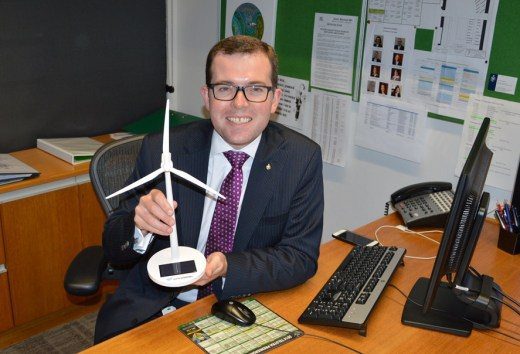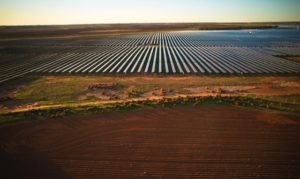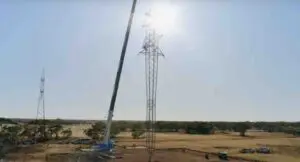Young National Party MLA Adam Marshall has only been in his role as New South Wales parliamentary secretary for renewable energy around two months, but already he is making his mark.
The 32-year-old Marshall, who was mayor of Gunnedah at the age of 23, represents the electorate of Northern Tablelands, which covers much of the same territory as Barnaby Joyce’s federal electorate of New England. Their views on renewable energy could hardly be more different.
As we reported on Friday, Marshall wants to slash the development fees for large-scale renewable energy projects, noting that in the case of one 300MW solar project slated for his electorate, fees are 10 to 20 times higher than for Victoria or Queensland.
He also used his speech to the North Coast Energy Forum in Coffs Harbour to repeat his push for peer-to-peer trading, which would allow solar households to share energy with other households, rather than being forced to sell their excess solar back to the grid for a peppercorn rate.
Marshall has pushed this line before, as we reported last month. But on Friday he went further, questioning why generators and retailers should try to clip the ticket on such transactions as it had “nothing to do with them.”
Marshall, in effect, is tapping into the massive opportunities for localised generation, for households, businesses, and local communities, and the massive frustration from solar households about the nominal sums they get paid for any exports. He is also recognising the rapidly shifting sands in the energy industry and technologies.
“If I can do only one thing – and I’ve only been in this role for 2 months – it is to have a genuine peer-to-peer energy scheme operating in this state,” he said to much applause from the audience.
“I say that because it just makes sense. I mean, duh. This is a way to get the second wave of community interest in PV solar and other renewables happening.
“We have got this thing called the distribution network – it is there, we should use it as much as possible.
“At the moment it just carries electricity from generators to us and that’s it, but there is an opportunity to use the network so much more effectively, to send electricity all sorts of ways.
“If I am generating excess power on my rooftop, why can’t I literally trade it down here with someone in Coffs Harbour? It’s all the same network, the same poles and wires.
“Why shouldn’t we then be able to pay a small fee or tariff to essential energy to freight my energy to your house, or your energy to my house? Why shouldn’t that happen? And why should generators or retailers be involved in that? They shouldn’t. It has nothing to do with them.”
“We are simply using a publicly funded and paid for and built network to have a freer exchange of energy from areas that generate excess to those that need energy, whether in times of peak demand or other times.”
Marshall says he also sees it as a cost saver for governments. So far some 2,500 schools in the state have rooftop solar and he would like to see all schools with rooftop solar.
When the schools were not in session on weekends or school holidays, the excess energy should be sold to a local hospital, fire station or ambulance station to reduce their operating costs, “rather than trickling back into grid for a nominal amount.”
The issue around feed-in tariffs for solar exports is about to intensify, with some 147,000 households in NSW about to lose their premium feed-in tariff, and likely to be paid as little as 5c/kWh – although some smaller retailers such as Enova are offering 10c/kWh for exports.
Solar advocacy organisation Solar Citizens describes the practice of paying 5c/kWh and then selling that power for four times that price (or more) to neighbours as “rampant profiteering”. It has unveiled a new campaign called ‘Fair Price for Solar’ to protect Australia’s 1.5 million solar owners.
“Solar owners are actually farming the sun, and like farmers across the country, they are primary producers who just want a fair go, and a fair price for their product,” said Claire O’Rourke, the national director of Solar Citizens.
“Just like the farming community, solar owners are up against hugely powerful companies and corporations who are trying to make obscene profits from the produce they supply. Solar owners only want a fair go for the contribution they make to powering Australia and taking pressure off the grid.”
Solar Citizens points out that this is a major issue for rural electorates, where the rate of household solar penetration is high. Eight of the 10 NSW seats with the highest proportion of households with solar installations are all held by the Nationals Party.











